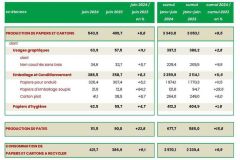Fearing a sharp contraction in demand due to the health crisis, the French Union of Cardboard, Paper and Cellulose Industries (Copacel) presented a two-part support plan to the government.
Here are the three axes of the first section dedicated to the ecological transition of the paper industry, detailed by Philippe d'Adhémar, President of Copacel.
1 - Encourage the development of energy-intensive industries in order to improve France's carbon footprint
The objectives of public policy in the fight against climate change (Climate Law presented in early March by the European Commission, Paris Agreement, national low-carbon strategy, etc.) require a reduction in greenhouse gas emissions on national territory. But this approach, which leads to an increase in the cost per tonne of carbon emitted, has the perverse effect of closing industrial sites and relocating factories to countries where the carbon constraint is less severe, explains Copacel.
Gold "In France, we produce products with a low carbon footprint, we are particularly well positioned compared to our foreign colleagues", protests Philippe d'Adhémar, president of Copacel.
"To maintain energy-intensive businesses, we would like to see the carbon footprint taken into account as a key indicator of climate policy, the maintenance of energy-intensive schemes and the introduction of aid to decarbonise heat (to replace gas by biomass or solid recovered fuels)."
Axis 2 - Encourage the use of bio-sourced products : cellulosic products
"Earlier this year, it was decided that government procurement would limit their purchases of office paper to recycled paper." However, this recycled paper is only made from other office paper fibres. "Office paper is intended to be recycled, but it is more easily recycled into packaging or other qualities than on its own (for whiteness issues in particular), notes Philippe d'Adhémar. We need virgin fiber input into the paper loop, because fiber is not infinitely recyclable. Encouraging 100% recycled is a erreur?! And that translates into a significantly higher carbon footprint import than non-recycled paper."
On this second axis of the support plan, the union is also attentive to the fact that some cardboard packaging contains a fraction of plastic - such as a lamination on the cups - which may bring them within the scope of current or future bans or restrictions on plastic packaging, despite a very high performance in terms of circular economy.
Copacel would like the "single use plastics" directives and the implementing texts of the law against waste and for the circular economy (known as the AGEC law) to encourage the use of bio-sourced products and calls for a balanced treatment by public procurement of products composed of virgin and recycled fibres.
Axis 3 - Improving the competitiveness of fibre raw material supplies
The supply conditions for fibrous raw materials (wood, paper and board for recycling and market pulp) are fundamental, as they are the first variable cost item in a paper mill.
However, the cost of wood and paper and board for recycling is dependent on the national conditions under which they are placed on the market, while pulp is dependent on world price trends.
Copacel is therefore calling for forest policies to take greater account of the economic dimension of forests and reduce the cost of wood delivered to mills, for the system for collecting and sorting paper and cardboard waste to promote the use of this resource when there is a threat to the availability of fibre packaging, and for France to be more autonomous in terms of cellulose pulp production (with relocations, for example).









